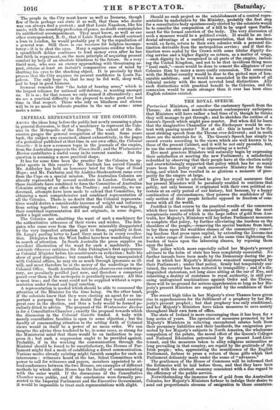IMPERIAL REPRESENTATION OF THE COLONIES.
AMONG the ideas long before the public but newly assuming a place in general discussion, is that of a machinery to represent the Colo- Ides in the Metropolis of the Empire. The extent of the dis- cussion gauges the general -recognition of the want. Some years back, the subject was examined, almost exhaustively, in the pages of a periodical published at that time in our own office, the Colonial Gazette : it is now a common topic in the journals of the empire, from the Australian papers to the Times itself ; and the Westminster Review contributes a useful essay in its current number. Bat the question is assuming a more practical shape.
It has for some time been the practice for the Colonies to ap- point agents in this country : Mr. Roebuck has served Canada; Mr. Adderley has held an honorary brief for the Cape of Good Hope ; and Mr. Fairbairn and Sir Andries Stockenstrom came over from the Cape on a special mission. The Australian Colonies are already represented by several residents in London. Certain of those residents have combined to form the Committee of Australian Colonists sitting at an office in the Poultry ; and recently, we un- derstand, attempts have been made to extend that Committee, by obtaining a more comprehensive and combined representation of all the Colonies. There is no doubt that the Colonial representa- tives would derive a Considerable increase of weight and influence from acting together; but something would still be wanting, if their combined representation did not originate, in some degree, under a legal sanction.
The Colonies are admitting the want of such a machinery for the authoritative utterance of their views and wishes. The dele- gates who came over from the Cape were miserably disappointed by the very imperfect attention paid to them, especially at first. Dr. Lang's parting letter to Lord Grey must be in every recollec- tion. Delegates from the West Indies have been wandering about in search of attention. In South Australia the press supplies an excellent illustration of the want for such a machinery. The Adelaide Observer criticizes Sir John Pakington's first appearance as Colonial Minister before his constituents on reelection ; hails his show of good dispositions ; but remarks that, being unacquainted with Colonial affairs, he may sin as much through ignorance as ill- will, and must therefore be at the mercy of the underlings in the Colonial Office. South Australian interests, observes our contempo- rary, are peculiarly penned just now, and therefore a competent guard over them in-the metropolis is peculiarly. necessary. All this is most true ; and the want could not be supplied without a repre- sentation under formal and legal sanction. A representation is needed which should be able to command the attention of the Minister for the time being. On the other hand, if the colonists knew that they were electing an agent for so im- portant a purposet there is no doubt that they would exercise great care in the election, and thus a body would be formed pe- culiarly fitted to advise. The proposal of the Westminster Review is for a Consultative Chamber ; exactly the proposal towards which the discussion in the Colonial Gazette tended. A body with merely consultative faculties is open to some objection ; but the faculty of commanding attention to the setting forth of Colonial views would in itself be a power of no mean order. We can imagine the advice thus tendered to be, in some cases, so strong for the Ministerial mind that there would be an inclination to sup- press it ; but such a suppression ought to be provided against. Probably, if in the working the communication through the Minister should be found to be unsatisfactory, the Houses of Par- liament might find a mode of establishing a direct communication. Various modes already existing might furnish samples for such an intercourse : witnesses heard at the bar, Select Committees with power to call for witnesses and papers, members appointed to at- tend conferences between the two Houses, are examples of different methods by which either House has the faculty of communicating with the outer world. If the discussions of the Consultative Chamber were public, and if the conclusions were formally pre- sented to the Imperial Parliament and the Executive Government, it would be impossible to treat such representations with slight. Should no such project as the establishment of a central repre- sentation be undertaken by the Ministry, probably the first step for a consultative body spontaneously elected by the colonists would be to consider the composition of a bill to be urged upon Parlia- ment for the formal sanction of the body. The very discussion of such a measure would be a political event. It would be an inci- dental advantage of a central representation, that the members would, ex facto, return to their own colonies with a personal dis- tinction derivable from the metropolitan service ; and if that dis- tinction were sealed by the Crown with some titular dignity du- ring service and a higher dignity on return, as a matter of usage, —such dignity to be recognized in all parts of the empire, includ- ing the 'United Kingdom, and not to be that invidious thing mere " local rank,"—more would be done to cement the allegiance of our Colonies than by many a more costly concession. The connexion with the Mother-country would be dear to the picked men of hon- ourable ambition ; and it would be associated in the minds of all Colonial society with the most coveted local distinctions. Ally such distinctions with practical benefit to the Colonies, and the connexion would be made stronger than it ever has been since English colonies existed.


























 Previous page
Previous page